Article 52: Coffee trade established the position of the Dutch power
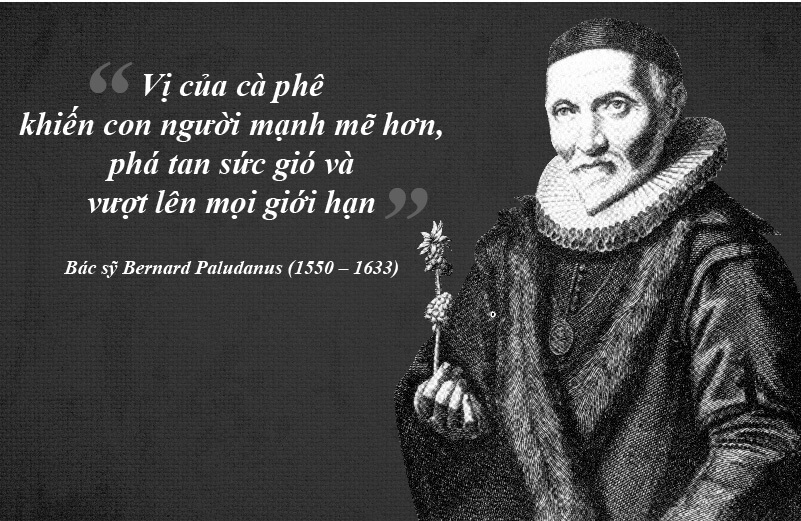
Coffee trade was an important factor, contributing to transforming the Dutch economy, turning this country into a global maritime power, dominating the world economy in the 17th century.
Coffee trade and economic power shifts
The Dutch have a saying “The Dutch made Holland”. Originating from a unique geographical position, about 26% of the area is located below sea level, without mountain ranges or natural borders to protect the territory. For most of its history, the Netherlands was conquered and ruled by the Roman Empire, Celtic tribes, Germans, Vikings, Austrians, and Spaniards. It was not until 1576 that the country was unified internally
The obstacle of geographical position gave the Dutch the advantage of superior sea knowledge, seafaring traditions and shipbuilding prowess over all other European powers. Thanks to that, when maritime trade arose in the 17th century, the Dutch dreamed of reaching out to conquer the world. Dutch traders are known as “investment philosophers”. They were not just merchants. In Dutch belief, the two trade patrons Mercury and Minerva represent erudition (eruditio), culture (humantas), wisdom (sapientia). An ideal merchant must strive to learn and strive to achieve the qualities of the god of commerce to create wealth and prosperity for the nation.
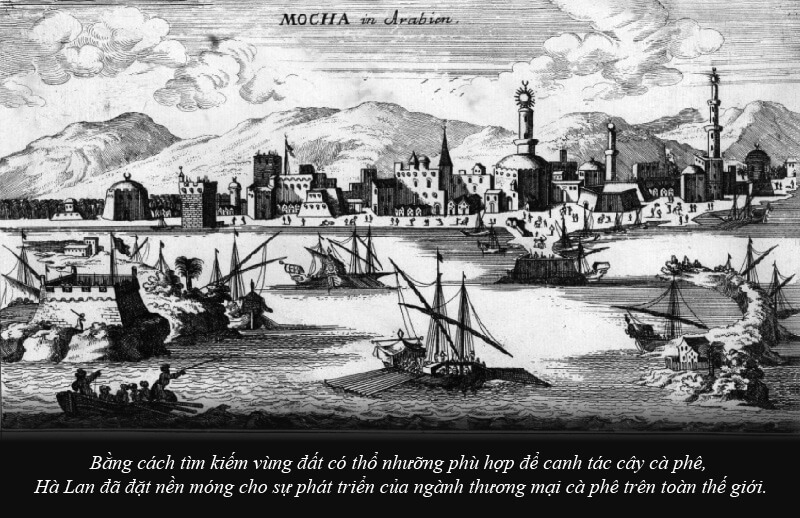
By finding the right soil to grow coffee, the Netherlands laid the groundwork for the growth of the global coffee trade
During trade with the Eastern empires, Dutch merchants soon became aware of coffee beans. Since the 16th century, coffee has been a popular drink and established social habits in the Ottomans, Middle East, South India, Persia, Horn of Africa, North Africa, the Balkans, Italy… Because the coffee business was the main source of income of the Ottoman Empire, so to keep the monopoly, they strictly controlled to prevent any seeds from leaving the territory. Before exporting through Mocha port, coffee beans were soaked in boiling water or roasted to ensure they cannot germinate. Even so, when the Dutch saw the economic value of coffee beans, they sought to replicate the seedlings on their colony to exploit.
In 1616, Pieter Van dan Broeck – a Dutch merchant brought coffee plants from Mocha to the Netherlands. In 1640, another merchant named Johann Siegmund Wurffbain offered the first commercial coffee shipment in Amsterdam. However, the Dutch climate was not suitable for large-scale coffee farming. In 1696, the Dutch shipped coffee plants to the island of Java in Indonesia, then expanded to Celebes, Timor, Bali (Asia) and Sumatra, Brazil (Americas). Coffee trees set roots to form a new raw material area.
In the 17th century, coffee was one of the most profitable ingredients in the world. Great powers Britain, France and the Netherlands engaged in stiff competition for market share. This led to the coffee trade becoming the economic determinant of the balance of power in Europe. The Dutch thoroughly exploited the coffee plantations in the colony. The Dutch East India Company (founded in 1602) conducted thorough research on the coffee supply chain. They entered into agreements that forced the colonies to participate in coffee production and transferred part of the production to the Dutch East India Company.
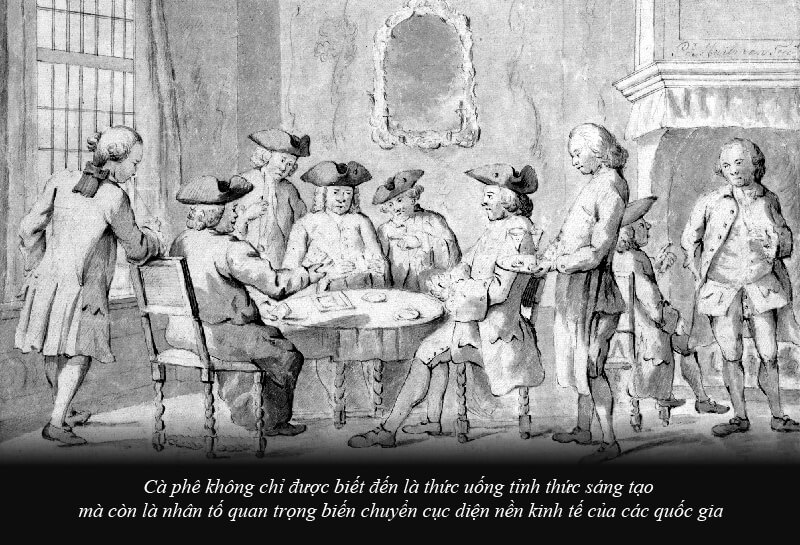
Coffee is not only known as a creative awakening beverage but also an important factor in transforming the economic situation of countries
A series of coffee plantations from Asia to the Americas became a source of coffee for Dutch consumption and export. Along with the strongest sea transport system of the time, the Netherlands gradually occupied the role of the largest coffee supplier in the world. The riches from the exploitation of commercial profits propelled the Netherlands past Spain and Portugal, becoming the flourishing empire that dominated the shipping industry in the 17th century.
“The Dutch Golden Age”
In his work “The Wealth of Nations”, the father of modern economics Adam Smith praised the Netherlands as the leading example of a commercial society, and free trade as the foundation of great wealth of the Dutch. The huge budgets generated by trade fueled one of the greatest epochs in Dutch history.
Wealthy businessmen played an important role in leading Dutch society. They participated in policy making activities and financial investment sponsoring the fields of art, science and technology, military, … especially education. The Netherlands eradicated illiteracy for its people by institutionalizing the education system, and orphans also received free education. The Dutch called this the process of accumulating human strength. In the mid-17th century, the proportion of highly educated people in the Netherlands increased dramatically.
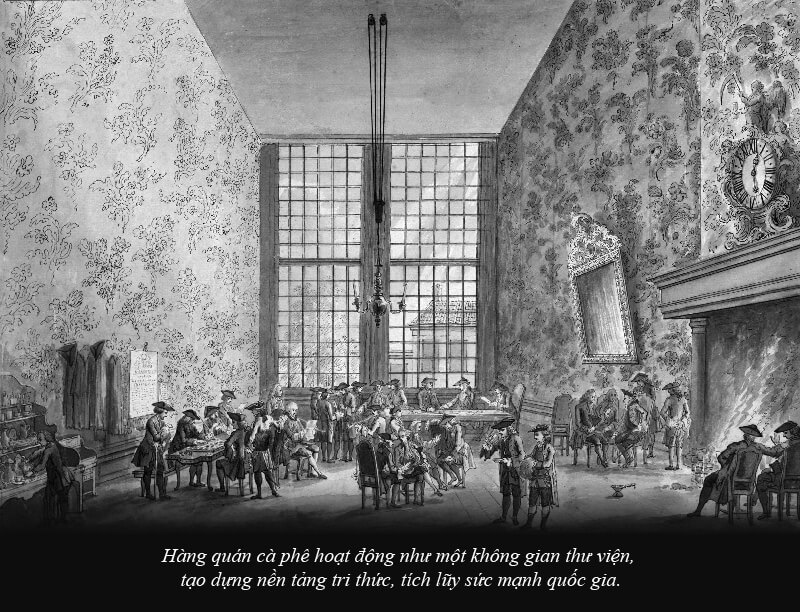
The coffee shop functioned as a library space, building a knowledge base and accumulating national strength.
Education awakened cultural and intellectual life. Demand for reading and popularizing books flourished. In the 17th century, more books were printed in the Netherlands than in all other European countries combined, and even a poor rural person could have access to knowledge from books. This was the fundamental foundation that created an unprecedented intellectual explosion. Philosophical – ideological trends, various forms of literature, art, science, etc. developed incomparably strongly. Coffee shops in this period also became library spaces. Most coffee shops in Amsterdam such as German Coffee House, North Holland Coffee House, English Coffee House… always have a lot of people coming to read books and participate in sharing the latest information.
The coffee trade also involved the interplay of knowledge between the West and the East. In the process of trading and expanding the coffee raw material area, the Dutch discovered and brought back to Europe the knowledge of a mysterious Asia, helping scientists to systematize the Western perception of the world. For example, in the work “The Mathematical Principles of Natural Philosophy” of scientist Isaac Newton, when explaining the tides, he mentioned the phenomenon of water level rising and falling only once a day at the port of Batsham in the Kingdom of Tunquini (Tonkin – Dai Viet territory controlled by Lord Trinh). The Dutch learned the fine arts of Chinese and Japanese ceramics, combined with the firing techniques learned from Italy to create a unique line of Delftware ceramics, which were exported throughout Europe. On the other hand, Dutch books and erudite experts also greatly influenced Asian countries. For 200 years, the Japanese have absorbed Western civilization through “Dutch studies”, directly impacting the scientific and technical foundation and modern thought of Japan.
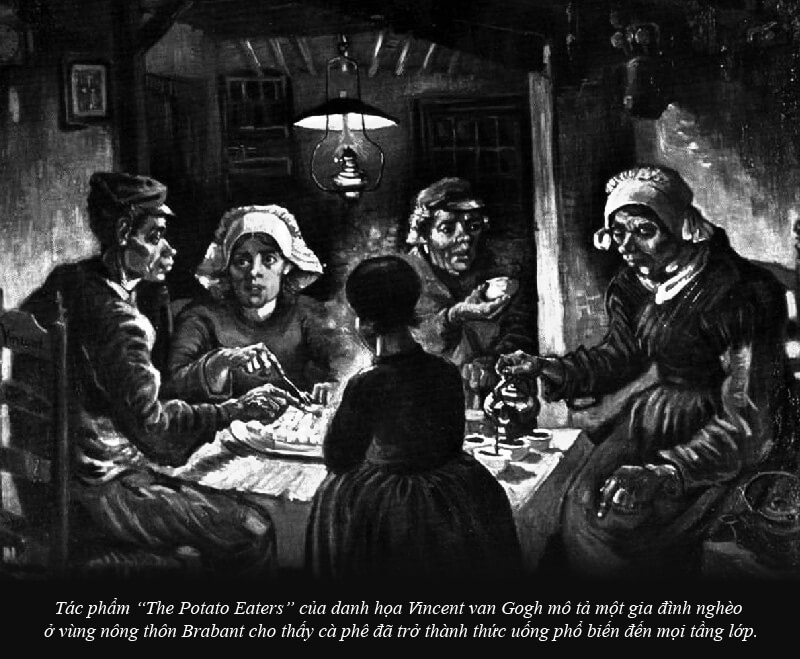
Vincent van Gogh’s “The Potato Eaters” depicting a poor family in rural Brabant shows that coffee had become a popular drink for all classes.
The success of the Dutch coffee trade has brought coffee beans to the world, expanding coffee raw areas, contributing to the diversity of coffee culture with countless variations of enjoyment modified to suit specific features of each country. At the same time, the coffee trade was also one of the factors that led to the “Dutch Golden Age”. An increasingly affluent society, a high level of education, and the flourishing fields of art, science, technology, philosophy and culture transformed the Netherlands from a land being ruled to be the most influential power in the world in the early modern period.
View more: https://bit.ly/caphetrietdao
THE REAL COFFEE
ROASTED ONLY FOR PEOPLE OF WISDOM!
Source: “The Philosophical Way of Coffee” – copyright by Trung Nguyen Legend


